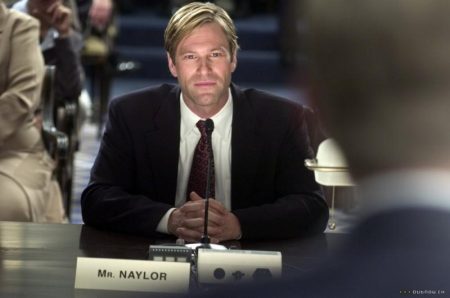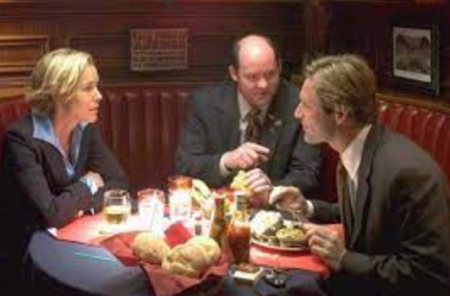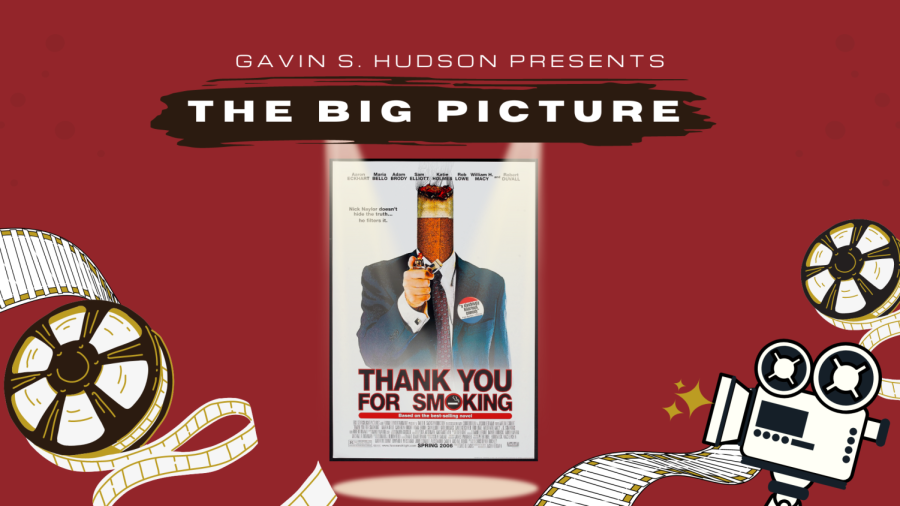The Big Picture: ‘Thank You for Smoking’
Graphic created in Canva by Dominique Williams and Gavin S. Hudson. Movie poster courtesy of 20th Century Fox.
November 12, 2022
Disclaimer: this review features spoilers.
“Thank You for Smoking” (2005), a political satire comedy directed by Jason Reitman, is a relatively unknown film despite being one of the more controversial movies in recent history.
“Thank You for Smoking” is one of my favorite films ever made. Its snappy dialogue combined with a calculated moral message still lives up as one of the most intriguing comedies I’ve ever seen.
While providing a comedic insight into a tobacco industry lobbyist, “Thank You for Smoking” illustrates an argument to the audience about the importance of choice in society.
Despite using cigarettes as a conduit to provide this argument, not once does a character actually smoke in the film.
Jason Reitman is the son of renowned director Ivan Reitman– known for the first two “Ghostbusters” films and “Space Jam”.
Though influenced by his father, Jason Reitman brings his own flavor to his work and keeps a grounded approach to filmmaking, while still allowing for realistic absurdity.
The film was originally released at Toronto International Film Festival in 2005 and received a theatrical release the following year.
Our deceptively charming main character Nick Naylor, played by Aaron Eckhart, is as witty as he is human. Naylor represents some of the worst parts of society while still trying to be the best father he can.

The dynamic between Nick and his son Joey– played by Cameron Bright– is by far the most interesting dynamic in the film.
Nick is a self-proclaimed “merchant of death” who has to balance duping the public into believing the notion that cigarettes don’t kill while teaching his son of the power of debate and free choice.
After some heartwarming banter, we’re shown that Joey is smart enough to understand the strength of debate while remaining curious of its power to influence the uninformed. Each scene with the two makes me reminisce on my relationship with my own father and my curiosity exploring the outside world while questioning everything I could.
The assorted jazz pieces littered throughout the score compliment the film excellently. The music helps further paint Nick’s work as on the fly improvisation that culminates in exciting “gotcha” moments where he argues his way into frustrating his opponent.
A favorite moment of mine is when Nick realizes the slippery slope that comes from labeling things as dangerous. He pressures Vermont Senator Finistirre, played by William H. Macy, into acknowledging that his state produces enough cheddar cheese to “clog the nation’s arteries,” leading to one of the best lines in the film.

Certain gimmicks in “Thank You for Smoking” help provide a distinct style to it. For instance, the opening credits utilizes illustrious backgrounds designed to resemble cigarette packaging while being accompanied by Tex Williams’ “Smoke! Smoke! Smoke! (That Cigarette).”
Another bit worth mentioning is Nick being plastered with nicotine patches by terrorists. The excess of the drug in his system is depicted with a scene reminiscent of an old-school workplace safety video.
As his body fills with nicotine, a hotel room in his mind begins to swell with smoke. An announcer gives instructions on how to leave the building, but reminds him, “there are still no conclusive studies that link smoking to emphysema.”
The cinematography in “Thank You for Smoking” works particularly well, because it helps create a distinct break from the usual run-of-the-mill shot composition most films of that era had. It feels refreshing to have creative and unorthodox shots break up the otherwise average visuals.
The film is well cast and features faces many would recognize today. Aside from Eckhart and Macy, J.K. Simmons, Robert Duvall, Katie Holmes and Sam Elliot all give notable performances.
One scene in particular features the release of an article by Katie Holmes’ character Heather Holloway. Her article details Nick’s behind the scenes exploits with his M.O.D. squad — called the Merchants of Death — and his highly immoral dealings on behalf of big tobacco.

Each character we’ve met so far gets to read a section of the article in which the behavior of Nick and his accomplices’ is under complete scrutiny. Their highlighted body language mixed with their monotone voice-over allows the audience to come to terms with the deeply disheartening scenes from earlier in the film, this time without their lighthearted jest.
To me, this is the brilliance of “Thank You for Smoking” encapsulated perfectly in one scene. The film’s objective is to argue for the importance of choice, but chooses to do so with the most scum of the Earth group of people possible.
Art is a beautiful thing with so much meaning to behold and “Thank You for Smoking” is some of my favorite art the film medium has to offer. Between the wit of each scene’s dialogue to the charm of the cast, accompanied by heavily stylized scenes, Jason Reitman excels at taking the time to present an argument to the audience under the guise of a comedic motion picture.
In my humble opinion, “Thank You for Smoking” is a 10/10 and I recommend it highly to anyone in need of a comedy worth talking about.







































































































































